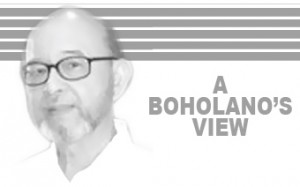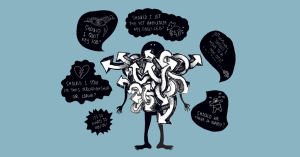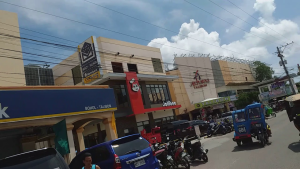 On February 4 the Konrad Adenauer Foundation sponsored the Symposium: “Overcoming Dictatorship: 30 Years of People Power†in the Philippines held in Makati.
On February 4 the Konrad Adenauer Foundation sponsored the Symposium: “Overcoming Dictatorship: 30 Years of People Power†in the Philippines held in Makati.
Welcome remarks by Benedikt Seemann, Country Representative of Konrad Adenauer Foundation in the Philippines. The Message of President B.S. Aquino III was delivered by Cabinet Secretary Jose R. Almendras.  Carsten Korber, Member of the German Bundestag [Parliament] spoke on the German Experience in “Overcoming Dictatorship Peacefully.â€
The comparison of the Filipino and the German “People Power experience was boldly set, emphasizing the great lessons to be learned by each nation and from each other.
Then the Town Hall Discussion addressed the question: “What does “People Power†mean to you?†This meant “to us in the Philippines as recalled by speakers on the leading actors in the “people power†revolt that climaxed in February, 1986 [30 years ago] in the defeat of Marcos in the presidential “snap election,†his overthrow as dictator by the “EDSA People Power Revolt,†and his exile in Hawaii sponsored by U.S. President Reagan. The U.S. government had supported the Marcos dictatorship from September 1972 to its overthrow in February 1986.
The host and moderator was Ms. Lynda Jumilla, chief of reporters of ABS-CBN News and noted anchor of the ABS-CBN News Channel’s Beyond Politics.
From the start of the Marcos dictatorship in October 1972, Benigno “Ninoy†Aquino as political prisoner became the moral leader of the suppressed national opposition. His assassination in 1983 at the national airport upon his return to the Philippines from medical leave in the United States and the people’s heroic adulation in his burial procession enhanced his stature as the opposition leader against the Marcos dictatorship.
This would lead to the rise of his widow, Cory, as the leader to contest the dictator when he declared a snap presidential election to be held in February 1986.
Aquilino “Nene†Pimentel spoke on Cory Aquino, the widow of Ninoy, as “a mere housewife,†and “the unlikely leader†who would, however, give “the face to People Power.†She would sacrifice her comfort, (like Gandhi did in his time in India). And Cory had the traits of sacrifice, accountability, humility, integrity, and generosity (SAHIG).
Pimentel acknowledged Jaime Cardinal Sin’s call to the people to join the EDSA people power revolt. With the urging of Lorenzo Tañada.
However, turning to the leaders we need now and candidates in the 2016 elections, Pimentel urged us to vote only for those who had character, competence, and courage.
Melinda de Jesus spoke on the role of the suppressed but courageous “Alternative Press†that engaged the public in anger and passion and thus helped make People Power against the dictatorship possible. She singled out “We Forumâ€, “Radio Veritasâ€, “Veritas Weeklyâ€, the “Mr. and Mrs†of Letty Jimenez Magsanoc, and “Business Day.â€
“The Alternative Press†pressed on truthful reporting in the struggle for “freedom, justice, and democracy.†It reported on the Moro National Liberation Front, human rights violations, the flow of Marcos wealth abroad. The “Alternative Press†acknowledged the role of Jaime Cardinal Sin and the various churches in the rise of “people power.† And it noted Cory Aquino as the emergent leader and popular choice to challenge Marcos the dictator. In all these roles, the Alternative Press helped make “people power†possible.
Courage to face the tanks; finding the strength in all of us. Sister Eusebia Talastas, Sister Digna Dacanay, and Sister Maribel Canceller are the famous nuns who arrived first at Camp Aguinaldo after the announcement that General Fidel V. Ramos (Constabulary Chief), Minister Juan Ponce Enrile, and the breakaway RAM soldiers were engaged in the coup against Marcos the Dictator.
Early on, the Sisters were engaged in “Education for the Poor†and “Education for Transformation.†Upon the assassination of Ninoy Aquino in 1983, they opted for “active nonviolence†against the dictatorship. They favored the Theology of Liberation. The three Sisters responded to the call of Jaime Cardinal Sin to go to EDSA and support the military coup against Marcos. They recalled that when the tanks came to EDSA, “we faced them together. When the helicopters came to EDSA we did not run away.â€
Faced by the totality of People Power at the EDSA Revolt (February 22-26, 1986) and the refusal and inability of the Marcos military forces to overcome the Revolt, Marcos had to go away to exile in Hawaii!
Former President Fidel V. Ramos contributed forcefully in the Conference. He did as a leader in the successful People Power Revolt in 1986 and a successor as President to Corazon Aquino in 1992-1998.
Quite participation of many young leaders who are members of the Centrist Democratic Party of the Philippines: Partido ng Tunay na Demokrasya. They occupied several round tables at the Conference and will be engaged in the political campaign and elections in May 2016. They will participate in the Party’s coming selection of national candidates to support.
Reflections on the Conference. The implicit assumption of the Conference discussion was that the People Power Revolt in 1986 had resulted in the restoration of democracy as hoped for and intended by our leaders.
My research and reflection is that the 1987 Constitution is high-minded in its vision “to build a just and humane society,†and “a democracy under the rule of law, and a regime of truth, justice, freedom, love, equality, and peace.†But we, Filipinos, have little tangible to show for our efforts to fulfill our high-minded constitutional vision.
We still have a political oligarchy (the rule of the rich) and rule of family dynasties. Our leaders have not passed the law to abolish the family dynasties and the law on freedom of information. We still have so much poverty and social inequality.
We have not reformed our obsolete and dysfunctional institutions: our kind of elections, political parties, our paralyzed and unaccountable Presidential Government, and our highly centralized Unitary Government under “Imperial Manila.†Our leaders have been effective in blocking the needed amendments to our 1987 Constitution. The President and Congress have failed to enact the Basic Law on the Bangsamoro Autonomous Region after 17 years of peace-making and reform efforts.
In the assessment study of our U.P. political scientists, Chasing the Wind, 2011, the authors conclude that we don’t yet have “a functioning democracy†as intended in our 1987 Constitution.
At best, I’d say, we only have “an aspiring democracy†weakly and vainly chasing our high-minded constitutional vision for a just and humane society and functioning democracy. (By Jose “Pepe†Abueva)




Be First to Comment